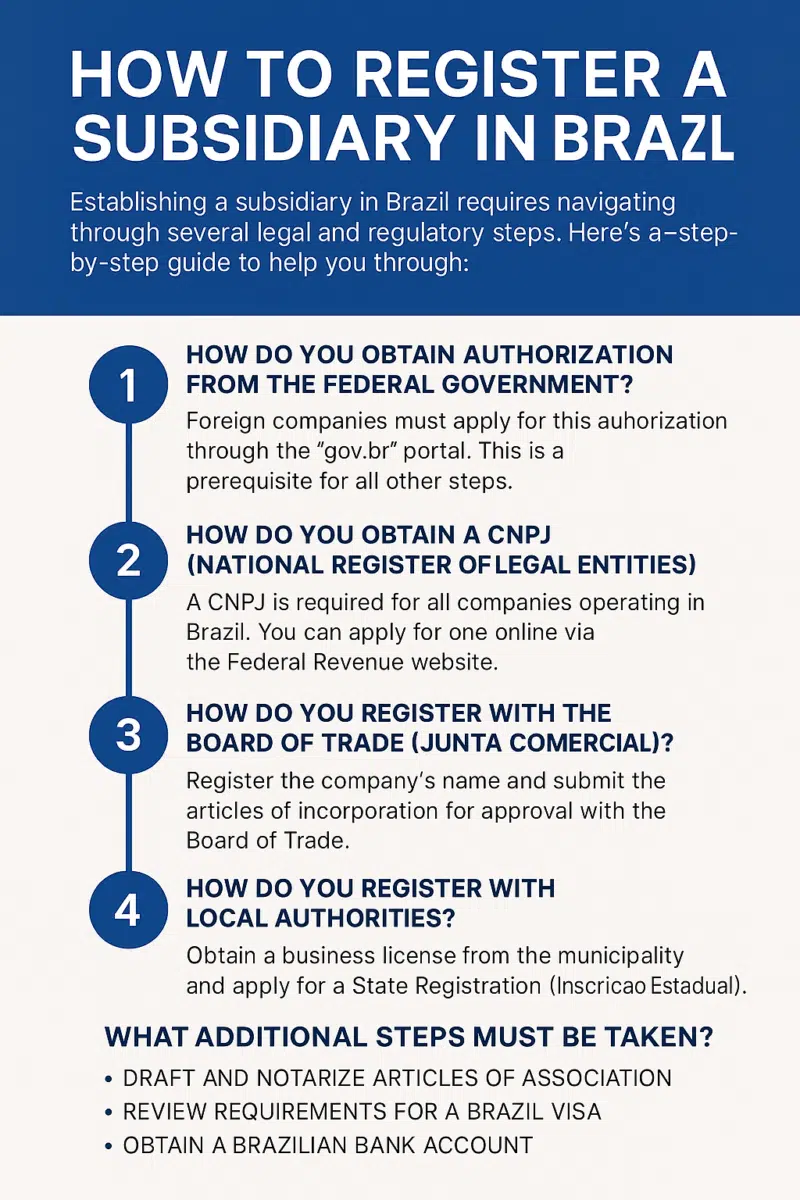Luis Fuentes, a finance specialist and international business expert, serves as Corporate Affairs Director at Alligare International LLC and leads Estudio Fuentes. With over 10 years of experience, he excels in financial advisory, business internationalization, and strategic corporate solutions, helping companies in Latin America, Europe, and Asia expand globally.
- Luis Fuenteshttps://perubizconnect.com/author/perubizconnect/
- Luis Fuenteshttps://perubizconnect.com/author/perubizconnect/
- Luis Fuenteshttps://perubizconnect.com/author/perubizconnect/
- Luis Fuenteshttps://perubizconnect.com/author/perubizconnect/
Learn how to register a subsidiary in Brazil with a clear, step-by-step guide covering legal, tax, and compliance essentials.
Table of Contents
How do you register a subsidiary in Brazil?
Establishing a subsidiary in Brazil is a strategic decision that requires navigating a complex legal and regulatory environment. To succeed, a foreign company must first obtain authorization from the Federal Government, secure a CNPJ (National Register of Legal Entities), and register with the Board of Trade and local authorities. If the subsidiary is owned by a foreign investor, registration with the Central Bank is also necessary.

What is the process to register a subsidiary in Brazil?
Foreign companies looking to establish a presence in Brazil must be prepared for a detailed process involving legal formalities, tax compliance, and operational requirements. Managing each step carefully is essential to ensure the subsidiary operates legally and efficiently within the Brazilian market.
Here’s a step-by-step guide to support you through the process:
How do you obtain authorization from the Federal Government?
The first step is securing authorization to operate in Brazil. Applications are submitted through the “gov.br” portal. Without this approval, further incorporation steps cannot proceed.
How do you obtain a CNPJ (National Register of Legal Entities)?
After obtaining authorization, the next step is registering for a CNPJ — Brazil’s tax identification number for companies, managed by the Federal Revenue. Applications are handled online through the Brazilian Federal Revenue Department’s platform. A CNPJ is essential for all tax and financial operations.
How do you register with the Board of Trade (Junta Comercial)?
The company must register its corporate name and articles of incorporation with the relevant Board of Trade. Verifying the availability of the business name in advance helps prevent unnecessary delays. The articles of incorporation must comply with Brazilian corporate requirements.
How do you register with Local Authorities?
You must also register with the municipal authority (Municipality) to obtain a local business license. Additionally, registration with the State Secretariat of Finance is required to receive the State Registration Number (Inscrição Estadual), particularly important for companies conducting commercial activities.
What additional steps must be taken?
Once initial registrations are complete, it’s important to address additional requirements that directly impact a company’s ability to operate legally and efficiently in Brazil. These elements often define the operational and financial sustainability of a subsidiary, including permits, legal representation, tax compliance, and labor obligations. The following sections outline the core components that ensure your business is properly established and fully compliant within the Brazilian regulatory framework.
How do you draft and notarize the Articles of Association?
Drafting clear and complete Articles of Association, outlining the company’s purpose, structure, and governance, is critical. These documents must be notarized to be legally valid.
What business permits might be required?
Depending on the industry, additional licenses or permits may be necessary from regulatory agencies. These could include environmental, health, or sector-specific authorizations.
What are the requirements for Brazilian visas and bank accounts?
Foreign nationals involved in the company’s management typically need a Brazil visa. Opening a local bank account is also essential for handling financial transactions and regulatory compliance.
Why is appointing a legal representative important?
Brazilian regulations require appointing a local legal representative who will act on behalf of the company before governmental authorities and ensure regulatory compliance.
How do you ensure tax compliance?
Brazil’s tax system is complex and multi-layered. Companies must ensure contributions to the Brazilian Social Security Institution (INSS) are handled correctly, alongside obligations like corporate taxes, VAT (ICMS), and municipal levies. Engaging with experienced local tax consultants is crucial.
What labor laws must be followed?
Brazilian labor law is comprehensive and protective of employees. Compliance with rules covering contracts, benefits, social security, and workplace safety is mandatory for all companies.
By following these steps and understanding the specific legal nuances of operating in Brazil, foreign companies can build a strong foundation for their subsidiary’s success.
What additional questions should you consider when registering a subsidiary in Brazil?
Even after understanding the main steps, foreign companies often encounter additional practical questions during the setup process. Based on real-world experience, these are important to consider:
What are the costs associated with registering a subsidiary?
Costs vary depending on the company’s structure and the state of registration. Typical expenses include legal services, government fees, notarization costs, setting up a bank account, and initial tax obligations.
How long does the entire process take?
The process typically takes between 4 to 8 weeks if documents are in order, though it can extend to 3 to 6 months depending on bureaucratic complexity.
Can a subsidiary own property in Brazil?
Yes, once properly registered, a subsidiary can purchase, sell, and manage property assets under its corporate name.
Is it mandatory to have Brazilian shareholders?
No, subsidiaries can be entirely foreign-owned. However, appointing a local legal representative is a mandatory requirement.
What are the ongoing compliance requirements?
Subsidiaries must maintain updated corporate books, submit annual tax returns, comply with labor regulations, and prepare financial statements according to Brazilian accounting standards (BR GAAP). Updates must be reported within 30 days of operational changes.
Are there incentives for foreign subsidiaries?
Yes, some states and municipalities offer tax incentives for investments in specific industries or regions. Researching these opportunities early can offer substantial benefits.
Is registering a subsidiary in Brazil worth the effort?
Drawing from practical experience, establishing a subsidiary in Brazil is a worthwhile endeavor for companies ready to engage with the country’s unique challenges. The bureaucratic processes can be demanding, but the market opportunities, economic diversity, and strategic position of Brazil often outweigh the initial difficulties.
Companies that plan carefully, build reliable local partnerships, and stay adaptable typically achieve strong long-term success. As with any international expansion, success in Brazil requires not only regulatory compliance but also cultural understanding, patience, and strategic foresight.
Finally, you might not only be interested in starting a business in Brazil, but also in expanding across Latin America.
PS: You might be interested in the service of COMPANY FORMATION AGENT IN LATIN AMERICA




